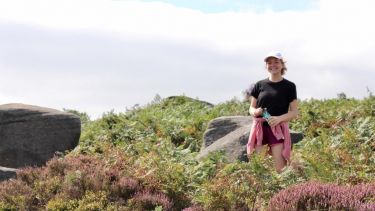My engineering degree opened the door to a job I love going to each day & I know I'll be working on some really exciting technology in my career.
Read: Our interview with Hannah
Who are you working for at the moment?
I work as a Renewable Graduate Engineer for Siemens Gamesa. They are a leading wind turbine manufacturer, covering the design, manufacture, installation and service of wind turbines. They are leading the world in both offshore and onshore wind turbine technology.
I joined the Siemens Gamesa graduate scheme the September after graduating. This is the first year that the graduate scheme I am on has been run, it’s partnered with the University of Hull where I study part time for a MSc in Offshore Wind Energy Engineering. It’s been great to build on the concepts I learnt at Sheffield with industry specific knowledge. I’m almost two years into the scheme, which runs for up to three years.
In your work, what are your main responsibilities?
I’m working in the construction team of the Hornsea 2 project on my current rotation. A big part of this is learning how the site works and what the processes are. Some of my main responsibilities have been looking at the process for lifting the components onto the vessel and supporting with a blade quality campaign. As a graduate engineer I get to see a real mix of tasks to understand the intricacies of how the turbine works and the technical issues we can face.
I had some really great maths and physics teachers at school who were probably my earliest role models, many of them were women which helped my confidence and dispelled myths about what an engineer, scientist or mathematician should look like.
Hannah Taylor-Clague
Aerospace Engineering BEng (Hons) Alumna
Why did you want to be an engineer?
When I was 13 we had an 'insight to engineering' day at school, and to be honest on the day I didn't pay much attention to it, but a few months later I found the leaflet in the bottom of a drawer and started to think about it again.
I hadn't heard of engineering and didn't know any engineers, but it was around this time that I realised how much I enjoyed maths and physics and that it could be a great option for me. I had always been quite creative and loved art too, engineering enabled me to combine creativity, logic and structure.
I had some really great maths and physics teachers at school who were probably my earliest role models, many of them were women which helped my confidence and dispelled myths about what an engineer, scientist or mathematician should look like. I didn't realise at the time, but looking back having these female influences in STEM at an early age really helped me stay confident in a male dominated industry.
What’s the best thing about being an engineer?
I love working through complex problems, thinking methodically but also having to consider new ideas and innovations. There are so many possibilities as an engineer to work on something you're passionate about and to find your niche. My engineering degree opened the door to a job I love going to each day and I know that I'll be able to work on some really exciting technology throughout my career.
Read more about Hannah's role at Siemens Gamesa and how her degree has helped her in industry.
We interviewed Hannah in August 2021.

International undergraduate scholarships
We are offering scholarships of £2,500 for each year (subject to a 60% average) of your undergraduate degree. The maximum value is £10,000 for four-year programmes.


